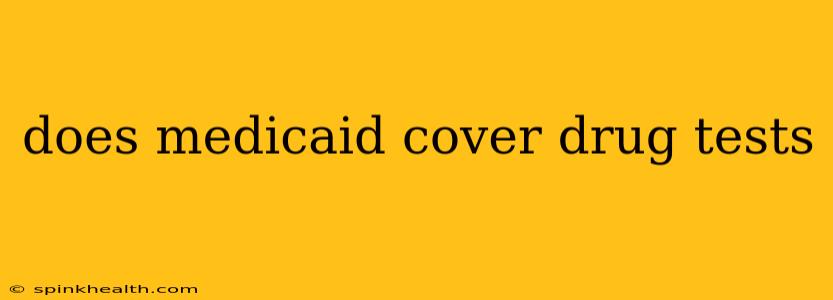Does Medicaid Cover Drug Tests? The Complex Reality
The question of whether Medicaid covers drug tests isn't a simple yes or no. It's a story woven with threads of state-specific regulations, the reason for the test, and the individual's specific circumstances. Think of it like a complex tapestry – beautiful, but requiring careful examination to appreciate its intricacies.
My journey into understanding this issue began with a conversation with a friend whose family relied on Medicaid. Their son, facing legal troubles, needed a drug test, and the financial burden was considerable. That's when I realized how many unanswered questions surround this seemingly straightforward query.
This blog post aims to unravel this complexity, providing you with a clearer understanding of the nuances surrounding Medicaid and drug testing coverage.
What are the different scenarios where drug testing might be necessary?
This is a crucial point to address, as the reason for the drug test significantly impacts whether Medicaid will cover it.
-
Employment: If the drug test is required as a condition of employment, Medicaid coverage is generally unlikely. Most employers are responsible for their own employee drug screening costs.
-
Child Protective Services (CPS) Involvement: This is a key area where Medicaid coverage might apply. If CPS is involved due to concerns about substance abuse impacting a child's well-being, the agency may order drug tests. In many cases, Medicaid will cover the cost of these tests because they're deemed necessary for the child's safety and protection. The specific regulations vary by state, however.
-
Court-Ordered Drug Testing: Similar to CPS involvement, if a court orders drug testing as a condition of probation, parole, or child custody, Medicaid might cover the cost. Again, the specifics depend heavily on state law and the individual's specific court order.
-
Treatment Programs: If someone is enrolled in a drug rehabilitation program covered by Medicaid, the drug tests conducted as part of that program are likely to be covered. This is a critical aspect of monitoring progress and ensuring the effectiveness of the treatment plan. It’s directly linked to the treatment, making coverage more likely.
Does Medicaid have a blanket policy on drug testing coverage?
No. There's no single, nationwide Medicaid policy regarding drug testing coverage. Each state has its own Medicaid program, and the rules governing drug test coverage vary significantly. Some states may cover certain types of drug tests under specific circumstances, while others may not cover them at all.
How does the type of drug test affect coverage?
The specific type of drug test requested can also play a role. While urine tests are the most common and generally more affordable, other methods (hair follicle testing, for example) might not be covered by Medicaid, even if the situation warrants a drug test.
What if my state doesn't cover drug tests under Medicaid?
If your state's Medicaid program doesn't cover drug testing, you might need to explore other options, such as:
- Negotiating with the provider: Sometimes, providers are willing to offer payment plans or discounts.
- Applying for financial assistance: There may be local or national organizations that provide financial assistance for drug testing.
- Seeking legal advice: A lawyer specializing in Medicaid or family law might be able to offer guidance on your specific situation.
Navigating the complexities of Medicaid drug test coverage requires careful research and potentially seeking legal or social services advice. It is vital to check with your state's Medicaid agency or a local healthcare professional for the most accurate and up-to-date information on coverage in your area. This information is for general guidance and should not be considered legal or medical advice.

